7 Tips for Sustainable Exercise for Beginners in Africa
By: Rukhsar Jabbar. M.Sc. Physiotherapy. Freelance Health Writer. Medical review and editorial support provided by the DLHA Team.
Physical inactivity cost the global healthcare system an estimated $53.8 billion USD in 2012 and is the fourth leading cause of death worldwide. However, new research suggests that 3.9 million premature deaths could be prevented annually with sufficient physical activity. Therefore, more efforts are needed to promote and maintain physical activity throughout life. [1]
Despite the well-known benefits of physical activity, many people still do not meet the recommended minimum of 150 minutes per week. Physical activity is widely recognised as an affordable and effective way to prevent and treat chronic diseases. Additionally, exercise positively impacts overall health and well-being. Yet, a large percentage of adults worldwide remain inactive. [2]
Starting and sticking to a fitness routine requires a change in behavior. A person's motivation, along with internal and external factors that either help or hinder progress, plays a key role in their ability to make these changes. [3]
This article aims to provide you with practical tips on how to get motivated and engaged in a regular exercise routine, especially if you are new to fitness or struggling with keeping up. The focus will be on developing enjoyable fitness habits, setting realistic goals, and creating sustainable routines.

Young black couple doing leg stretch exercise. Credit: Freepik
Start slowly when beginning exercise. The key to you starting a fitness routine safely is to build gradually from your current fitness level. Progress steadily by starting with low-impact exercises. Always warm up before and cool down after your workout.
If you're exercising outdoors, stay aware of your surroundings, and remember to drink water hydrate before, during, and after, even if you don’t feel thirsty. Engage in activities like soccer, basketball, or catch, and wear appropriate shoes and clothing that match your fitness level. [4]
Pay attention to how you feel during these initial workouts. If they feel challenging, begin at a comfortable level and gradually increase intensity. If they feel easy, challenge yourself to aim higher and push your limits. [4]
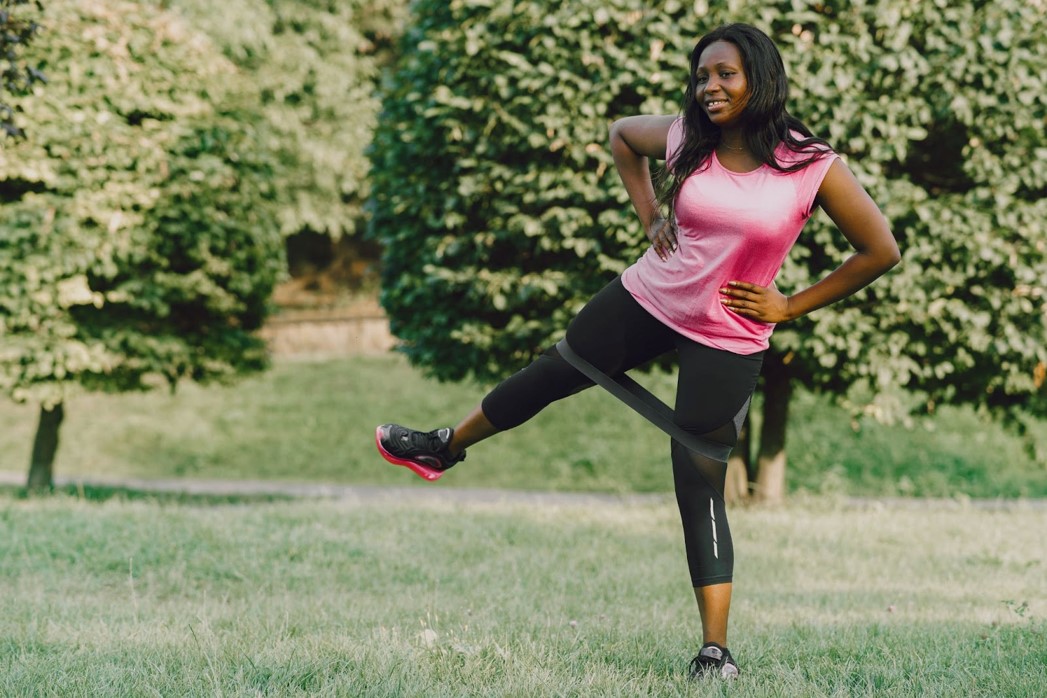
A young black lady doing leg strengthening exercise with a thigh band. Credit: Freepik.
Having a clear goal in mind is a strong motivator for sticking with a project. The best goals are those that are meaningful, practical, and specific to you. As you progress or your needs change, regularly reassess your objectives.
Setting short-term goals can help you incorporate physical activity into your daily routine. Think about what you need to achieve these goals, such as buying walking shoes or keeping an activity log. Make sure your short-term goals truly motivate you to exercise. [4]
Here are some examples:
- "I will try to move more today."
- "I will research local exercise classes tomorrow."
- "By the end of the week, I’ll talk to a friend about working out together a few times a week."
- "Within two weeks, I’ll get the right shoes and clothing so I can start walking for fitness."
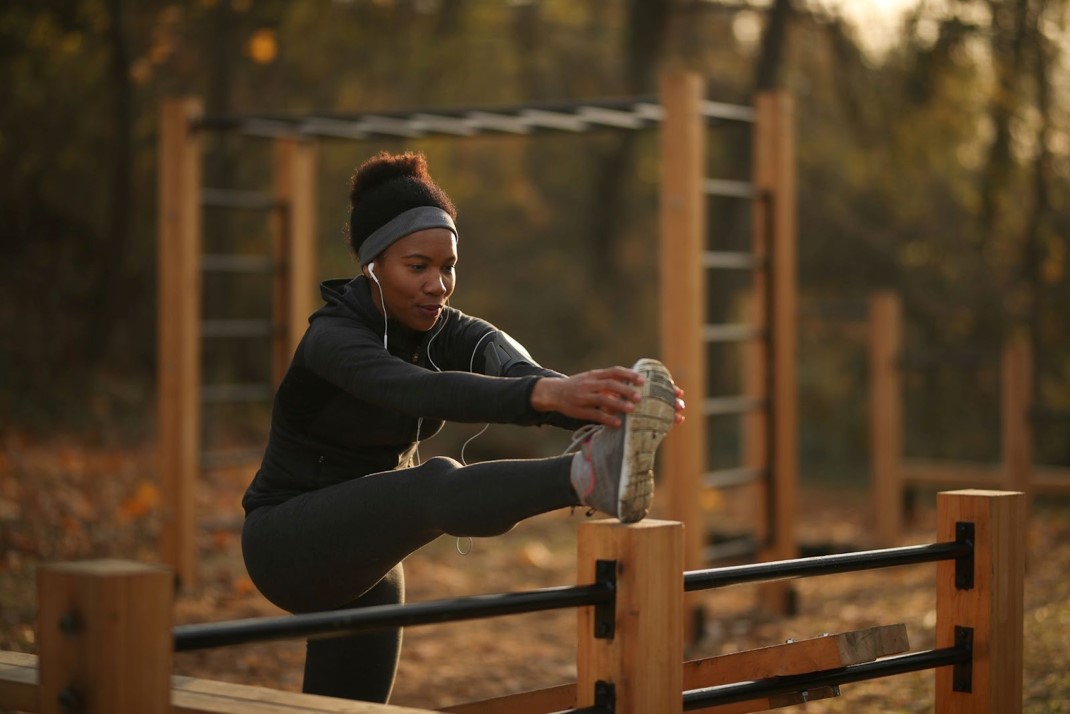
A young black girl doing raised leg stretch exercise in a park. credit: Freepik
You can include exercises you enjoy in your routine, and you’ll be more likely to stick with them. Activities like walking, cycling, swimming, and dancing can be fun and engaging. Try different exercises to discover what you enjoy the most, then incorporate them into your workout plan.
Physical activity (PA) has long-term benefits for your psychological, emotional, and physical health. However, people often stop exercising over time due to personal or environmental factors. Boosting intrinsic motivation through activities that are interesting and enjoyable can help maintain long-term commitment to PA.
Incorporating a mix of familiar and new exercises can increase both enjoyment and adherence to physical activity, ultimately improving health. Digital platforms like smartphone apps and interactive video game systems (exergames) are effective alternatives to encourage participation in PA and enhance quality of life. [1]
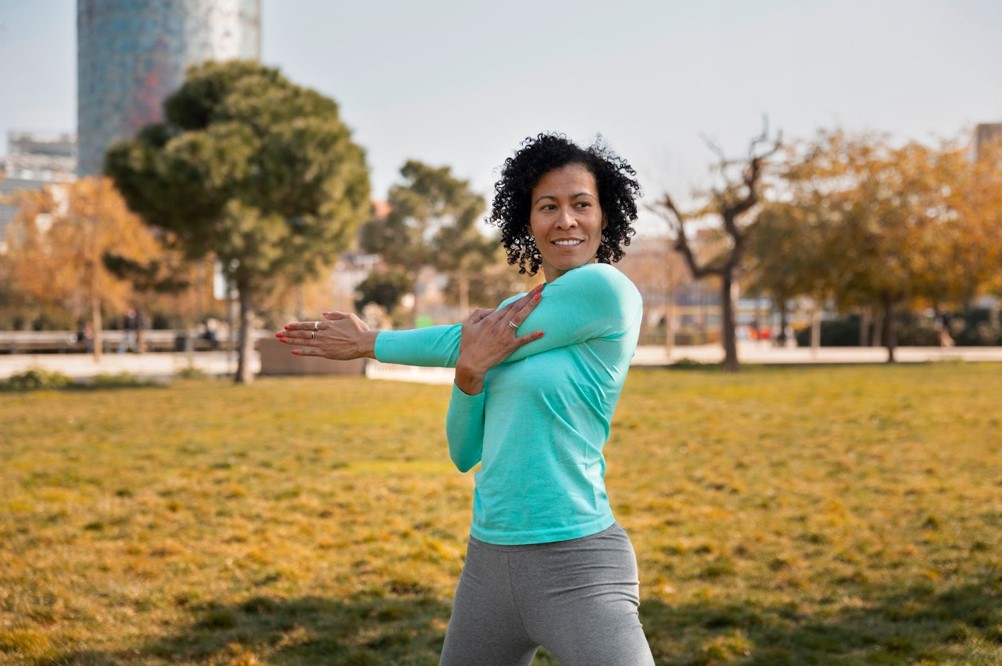
A middle aged black lady performing arm and core strengthening exercise outdoor. Credit: Freepik
To begin with, you can introduce mild exercises into your daily schedule, such as walking for 20 minutes after lunch or dinner or using the stairs rather than the lift. Avoiding long hours of sitting and making efforts to walk in between free breaks or after every 30 minutes.
Making time for physical activity might be challenging when one has so many demanding obligations and hectic schedules. Small steps, nonetheless, do lead to major transformations.
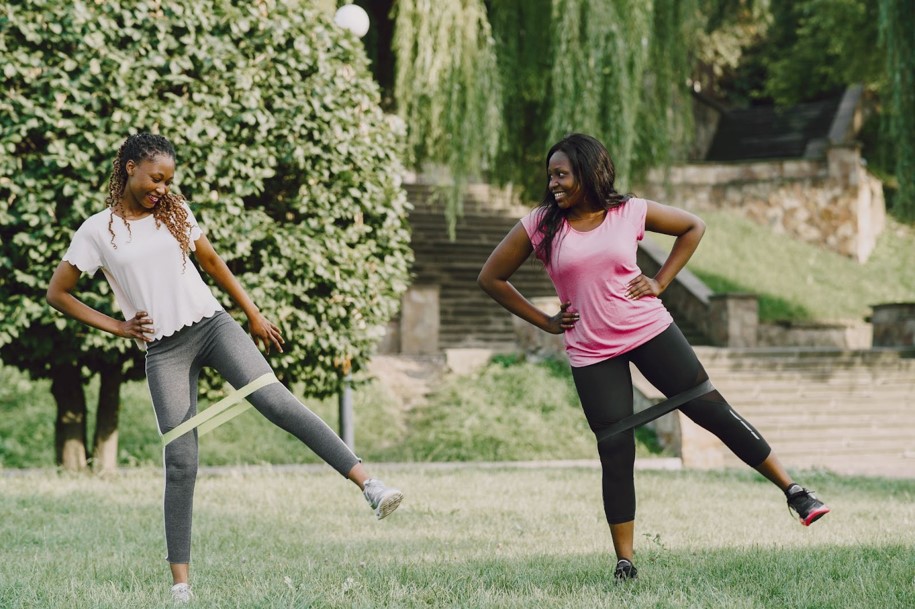
Two young girls partnering up exercising outdoor. Credit: Freepik
Joining an exercise group with a friend is one of the best ways to stay motivated and incorporate physical activity into your life. Exercising with others increases your chances of sticking to your fitness routine and allows you to socialize with like-minded individuals. Attending group fitness classes provides a fun way to work out while enjoying the benefits of teamwork.
There are many reasons to sign up for a group exercise session. These classes offer numerous advantages, from improved physical health to heightened motivation. While exercising alone can feel isolating, being part of a group lets you connect with others who share similar interests and goals.[5]
When you work out alone, it’s easy to fall into a monotonous routine, repeating the same exercises daily. In contrast, group fitness classes introduce variety and new workouts, keeping your routine fresh and exciting. [5]
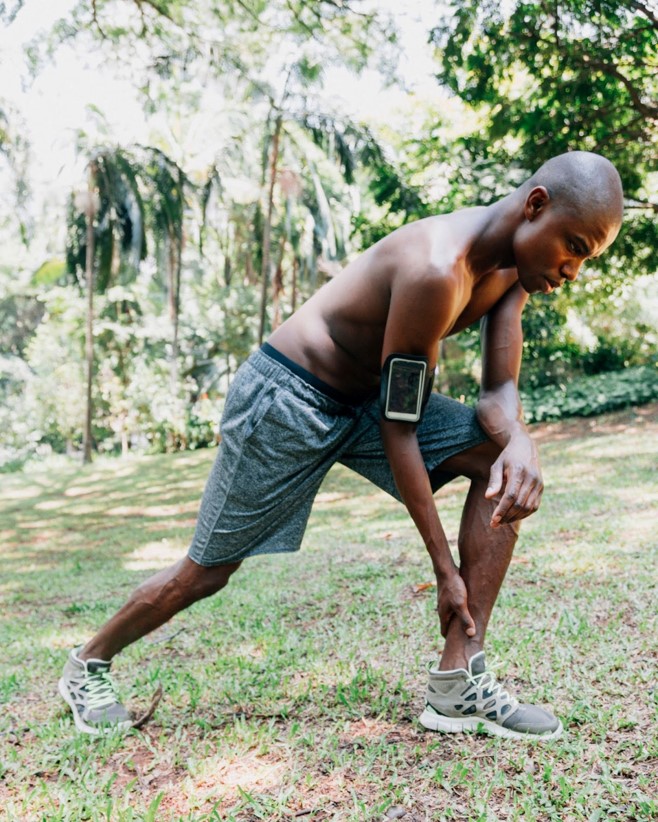
An adult black exercising outdoor with a wearable smartphone on the right arm Credit: Freepik
Fitness applications help users track your exercise and fitness data, provide training programs, and offer healthy living recommendations. These apps can enhance your walking habits, increase workout frequency, and promote regular physical activity. Continued use of fitness apps can improve physical, emotional, social, and cognitive well-being. [6]
Digital platforms, including smartphone applications and interactive video game systems (often called exergames), also effectively promote participation in physical activity and enhance quality of life. [1]
In the past decade, wearable activity trackers have gained popularity as consumer electronics that allow individuals to monitor their physical activity. These trackers, along with online programs that offer tracking and motivational features, make it easy for users to measure their activity levels. Studies show that wearable trackers can effectively encourage temporary increases in physical activity among consumers.[7]
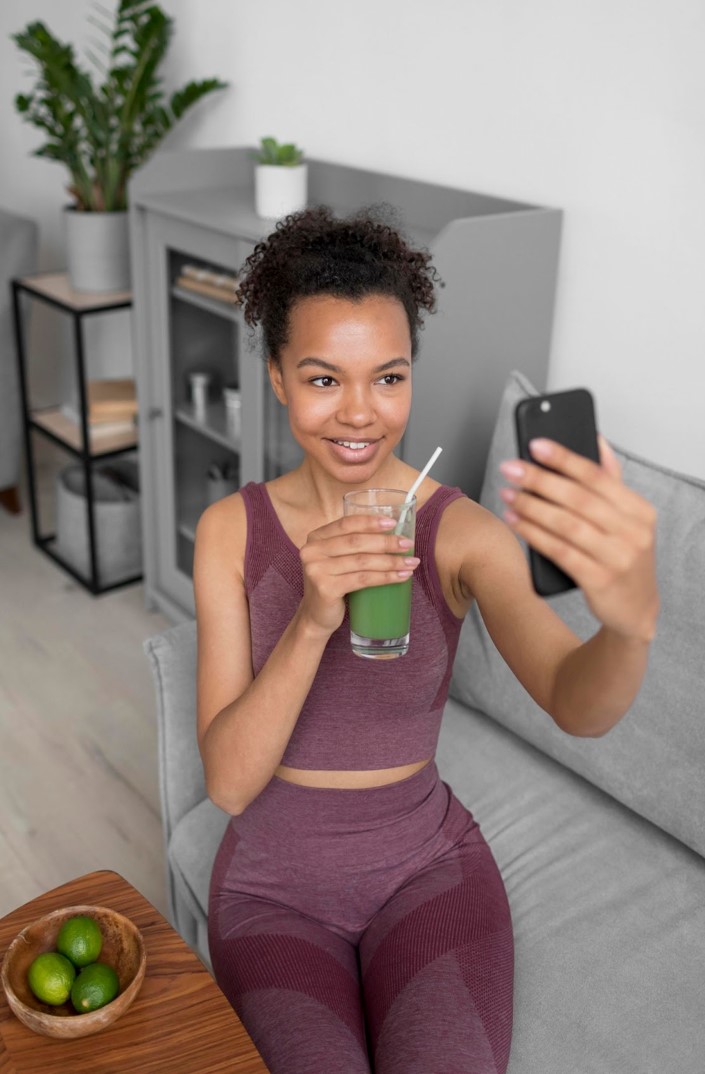
A young black lady sitting on a couch and taking a selfie with a glass of smoothie in her right hand. Credit: Freepik
After working out, acknowledging little victories can help you stay motivated and maintain healthy behaviours. Here are some suggestions for honouring your accomplishments:
After your workout, reward yourself with a nutritious snack.
After reaching a particular fitness goal, you can treat yourself to a special present or watch your favourite movie.
Keeping track of your caloric intake and the progress you make after working out will help you stay motivated and give you a sense of accomplishment for how far you've come. rewarding yourself for your efforts with a soothing activity after your workout, such as a warm bath, massage, or stretching session.
After mastering a fundamental activity, it can be thrilling and difficult to set an advance goal.
Rest days are a great way to reward yourself for your efforts and help you recover.
These small celebrations reinforce consistency and make the exercise journey more enjoyable.
References:
1. Lakicevic N, Gentile A, Mehrabi S, Cassar S, Parker K, Roklicer R, et al. Make fitness fun: could novelty be the key determinant for physical activity adherence? Front Psychol [Internet]. 2020 Oct 15 [cited 2024 Sep 20];11:577522. Available from here.
2. Tuso P. Strategies to increase physical activity. Perm J [Internet]. 2015 [cited 2024 Sep 18];19(4):84–8. Available from here.
3. Teo JL, Zheng Z, Bird SR. Identifying the factors affecting ‘patient engagement’ in exercise rehabilitation. BMC Sports Sci Med Rehabil [Internet]. 2022 Feb 7 [cited 2024 Sep 18];14:18. Available from here.
4. National Institute on Aging [Internet]. 2020 [cited 2024 Sep 19]. How older adults can get started with exercise. Available from here.
5. ASFA [Internet]. [cited 2024 Sep 20]. Top 10 benefits of joining a group fitness class. Available from here.
6. Cai J, Li G. Exercise or lie down? The impact of fitness app use on users’ wellbeing. Front Public Health [Internet]. 2024 Jan 10 [cited 2024 Sep 19];11. Available from here.
7. Tang MSS, Moore K, McGavigan A, Clark RA, Ganesan AN. Effectiveness of wearable trackers on physical activity in healthy adults: systematic review and meta-analysis of randomized controlled trials. JMIR Mhealth Uhealth [Internet]. 2020 Jul 22 [cited 2024 Sep 25];8(7):e15576. Available from here.
Published: September 30 2024
© 2024. Datelinehealth Africa Inc. All rights reserved.
Permission is given to copy, use and share content for non-commercial purposes without alteration or modification and subject to source attribution.
DATELINEHEALTH AFRICA INC., is a digital publisher for informational and educational purposes and does not offer personal medical care and advice. If you have a medical problem needing routine or emergency attention, call your doctor or local emergency services immediately, or visit the nearest emergency room or the nearest hospital. You should consult your professional healthcare provider before starting any nutrition, diet, exercise, fitness, medical or wellness program mentioned or referenced in the DatelinehealthAfrica website. Click here for more disclaimer notice.